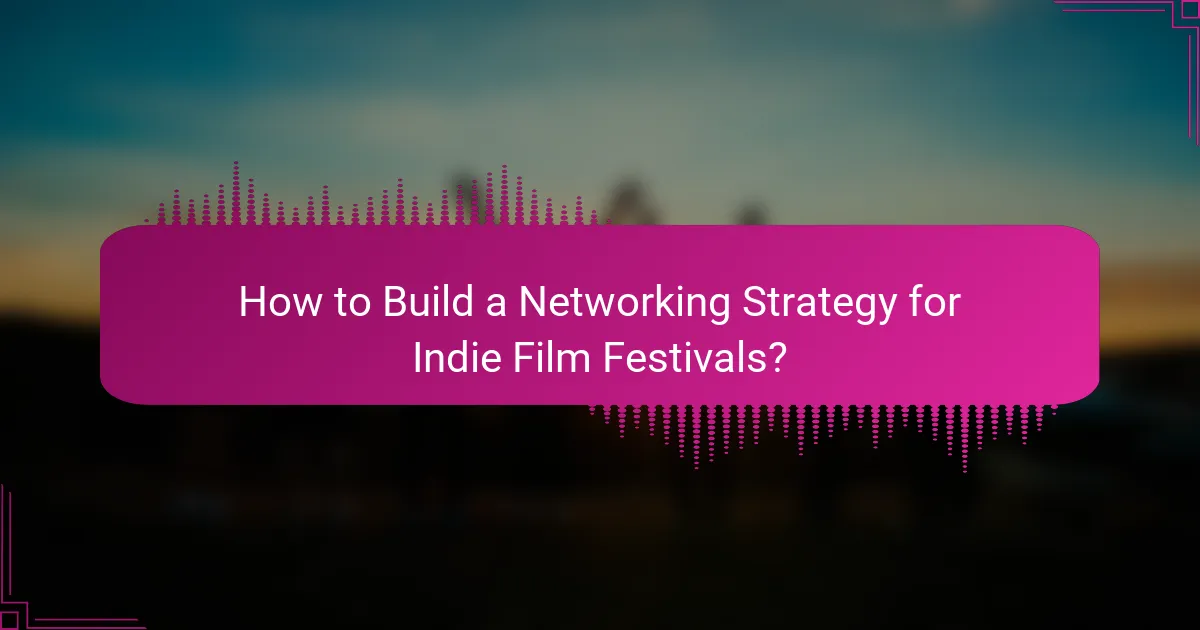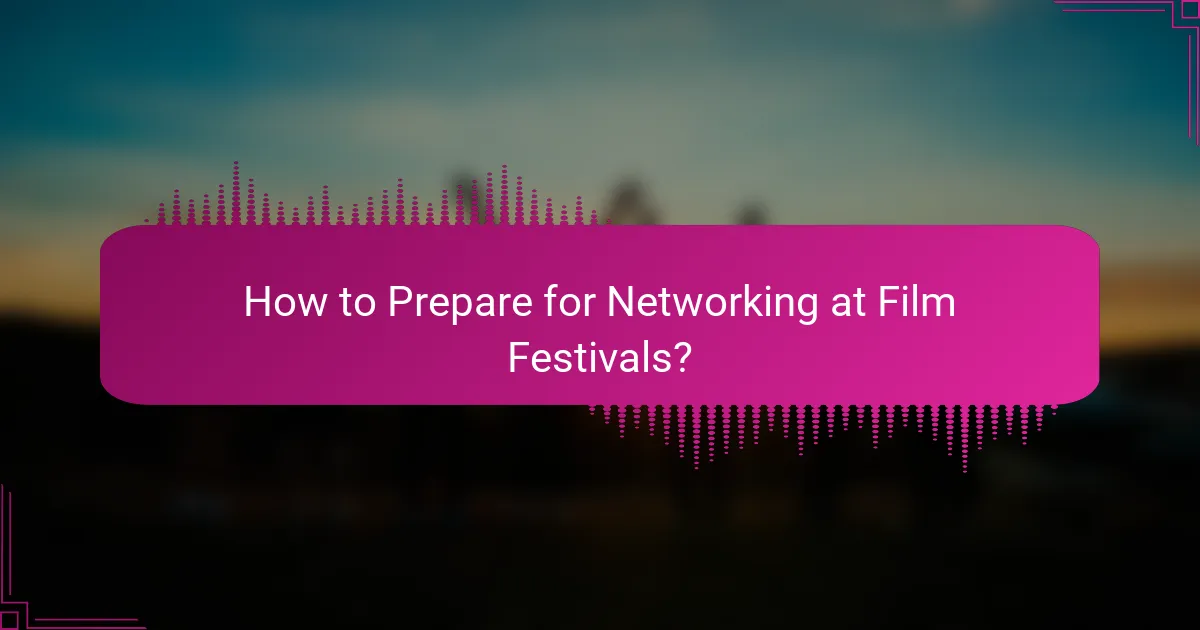Developing a networking strategy for indie film festivals is essential for filmmakers looking to enhance their visibility and forge valuable connections within the industry. By identifying key contacts, leveraging social media, and actively engaging at events, you can maximize your opportunities to connect with industry professionals and audiences alike. Festivals like Sundance and Cannes provide unique platforms to showcase your work and collaborate with others, making strategic preparation crucial for success.

How to Build a Networking Strategy for Indie Film Festivals?
Building a networking strategy for indie film festivals involves identifying key contacts, leveraging social media, attending events, utilizing databases, and developing a personal pitch. A well-rounded approach can enhance your visibility and create valuable connections in the film industry.
Identify key industry contacts
Start by researching filmmakers, producers, distributors, and other industry professionals who regularly attend indie film festivals. Create a list of these contacts, noting their roles and the festivals they frequent. This targeted approach helps you focus your networking efforts on individuals who can influence your career.
Consider reaching out to alumni from your film school or industry associations, as they can provide introductions to key players. Networking is often about who you know, so leverage existing connections to expand your reach.
Leverage social media platforms
Social media is a powerful tool for connecting with industry professionals. Platforms like LinkedIn, Twitter, and Instagram allow you to follow key figures, engage with their content, and share your own work. Regularly posting updates about your projects can attract attention and foster relationships.
Join relevant groups or forums on these platforms to participate in discussions and showcase your expertise. Engaging with others in the community can lead to valuable connections and opportunities.
Attend networking events
Participating in networking events at film festivals is crucial for building relationships. Look for panels, workshops, and mixers specifically designed for filmmakers and industry professionals. These settings provide opportunities to meet people in a more relaxed environment.
Prepare to introduce yourself and your work succinctly. Bring business cards or digital contact information to share easily. Follow up with new contacts after the event to maintain the connection.
Utilize film festival databases
Film festival databases can be invaluable for identifying potential contacts and opportunities. Websites like FilmFreeway and Withoutabox list festivals, submission guidelines, and participant information. Use these resources to find festivals that align with your film’s genre and audience.
Additionally, some databases offer networking features, allowing you to connect with other filmmakers and industry professionals directly. Take advantage of these tools to expand your network effectively.
Develop a personal pitch
A strong personal pitch is essential for making a memorable impression. Your pitch should clearly articulate who you are, what your film is about, and what you seek from the connection—be it funding, collaboration, or mentorship. Keep it concise, ideally under a minute.
Practice your pitch with friends or colleagues to refine your delivery. Tailor your pitch to different audiences, emphasizing aspects that resonate with specific contacts. A well-crafted pitch can open doors and facilitate meaningful conversations at festivals.

What Are the Best Indie Film Festivals for Networking?
The best indie film festivals for networking are those that attract industry professionals, filmmakers, and audiences eager to discover new talent. Festivals like Sundance, SXSW, Cannes, Toronto, and Tribeca offer unique opportunities to connect, collaborate, and promote your work in a vibrant environment.
Sundance Film Festival
Sundance is one of the most prestigious indie film festivals, held annually in Park City, Utah. It attracts a diverse crowd of filmmakers, distributors, and media, making it an ideal place for networking. Attendees can participate in panels, workshops, and informal gatherings to build relationships and discuss projects.
To maximize networking at Sundance, consider attending industry events and screenings where you can meet potential collaborators. Be prepared with business cards and an elevator pitch to introduce yourself and your work effectively.
South by Southwest (SXSW)
SXSW, held in Austin, Texas, is a unique blend of film, music, and interactive media. This festival creates a dynamic atmosphere for networking, as it attracts a wide range of creative professionals. The film portion includes screenings, Q&A sessions, and networking events that facilitate connections across various industries.
To make the most of SXSW, focus on attending events that align with your interests and goals. Engage in discussions during panels and be open to meeting people from different backgrounds, as this can lead to unexpected collaborations.
Cannes Film Festival
Cannes, located in France, is renowned for its glamour and prestige in the film industry. The festival is a hotspot for filmmakers, producers, and distributors, providing ample networking opportunities. The Palais des Festivals hosts numerous events, screenings, and parties where industry professionals gather.
Networking at Cannes requires a strategic approach; prioritize invitations to exclusive events and screenings. Building relationships with international contacts can open doors for future projects, so be prepared to engage in meaningful conversations.
Toronto International Film Festival
The Toronto International Film Festival (TIFF) is a key event for filmmakers looking to gain exposure and connect with industry insiders. Held in September, TIFF showcases a wide range of films and attracts a global audience, including distributors and critics. Networking opportunities abound during screenings, panels, and social events.
To enhance your networking experience at TIFF, attend industry-focused events and be proactive in introducing yourself to others. Follow up with new contacts after the festival to maintain relationships and explore collaboration possibilities.
Tribeca Film Festival
Tribeca, based in New York City, is known for its focus on independent storytelling and innovation. The festival features a mix of screenings, panels, and networking events that cater to filmmakers and industry professionals. This environment fosters connections and discussions around new projects and ideas.
To effectively network at Tribeca, take advantage of the festival’s workshops and panels. Engage with fellow filmmakers and industry experts, and consider participating in Q&A sessions to showcase your knowledge and passion for film.

How to Prepare for Networking at Film Festivals?
Preparing for networking at film festivals involves strategic planning and proactive engagement. Focus on understanding the event’s attendees and speakers, creating a clear networking plan, and being ready to showcase your work effectively.
Research attendees and speakers
Identifying key attendees and speakers at the festival is essential for effective networking. Look for industry professionals, potential collaborators, and decision-makers who align with your film’s genre or themes.
Utilize social media platforms like LinkedIn and Twitter to gather information about their backgrounds and interests. This knowledge will help you tailor your conversations and make meaningful connections.
Create a networking plan
A well-structured networking plan outlines whom you want to connect with and how you’ll approach them. Prioritize your targets based on their relevance to your projects and the potential benefits of connecting with them.
Consider scheduling specific times to meet these individuals, whether through formal meetings or casual encounters during festival events. Having a plan keeps you focused and maximizes your networking opportunities.
Prepare promotional materials
Having promotional materials ready is crucial for making a strong impression. Create business cards that include your contact information and a brief description of your work.
Additionally, consider preparing a digital portfolio or a one-sheet that highlights your film projects, including key visuals and a synopsis. This allows you to share your work quickly and effectively with interested parties.
Practice your elevator pitch
Your elevator pitch should succinctly convey who you are, what you do, and what makes your film unique. Aim for a duration of around 30 seconds to keep it engaging and concise.
Rehearse your pitch multiple times to ensure you deliver it confidently. Tailor your pitch based on your audience, emphasizing aspects that resonate with their interests or needs.
Set networking goals
Establishing clear networking goals helps you stay focused during the festival. Decide on the number of new contacts you want to make or specific individuals you aim to meet.
Track your progress throughout the event, adjusting your approach as necessary. Setting goals not only enhances your networking efficiency but also boosts your confidence as you achieve them.

What Are the Key Networking Techniques for Indie Filmmakers?
Indie filmmakers can enhance their networking efforts by employing targeted techniques that foster connections and build relationships. Key strategies include following up after initial meetings, engaging in meaningful conversations, utilizing business cards effectively, and participating in panel discussions.
Follow up after initial meetings
Following up after initial meetings is crucial for solidifying connections made at film festivals. A timely email or message expressing gratitude for the conversation can keep you on their radar and open doors for future collaboration.
Consider sending a follow-up within a few days of the event. Personalize your message by referencing specific topics discussed, which shows genuine interest and helps the recipient remember you.
Engage in meaningful conversations
Engaging in meaningful conversations goes beyond small talk; it involves discussing shared interests and industry insights. Ask open-ended questions that encourage dialogue and allow you to showcase your passion for filmmaking.
Listen actively and be prepared to share your own experiences and projects. This two-way exchange can lead to deeper connections and potential partnerships down the line.
Utilize business cards effectively
Business cards remain a vital tool for networking at film festivals. Ensure your card includes essential information such as your name, role, and contact details, along with a brief description of your work or a link to your portfolio.
Distribute your cards strategically during conversations, and consider including a QR code that links to your online presence. This makes it easy for others to connect with you later.
Participate in panel discussions
Participating in panel discussions can significantly boost your visibility within the indie film community. It positions you as a knowledgeable figure and allows you to share your insights with a broader audience.
Prepare thoroughly for your panel by researching the topic and anticipating questions. Engaging with the audience during Q&A sessions can also lead to networking opportunities with attendees who share your interests.
